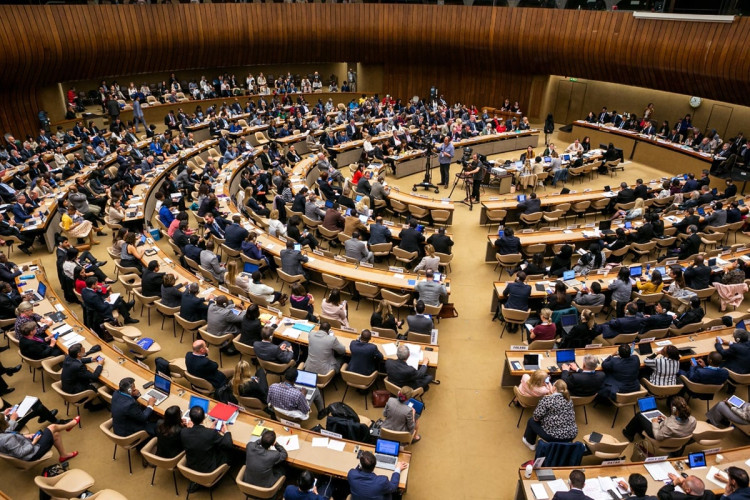As health leaders and policymakers from around the world convened in Geneva for the 78th World Health Assembly, one issue continued to dominate the agenda – the staggering increase of non-communicable diseases.
This rising wave of chronic illnesses like cancer, diabetes, heart disease, kidney disease and respiratory conditions has been building. As of today, it is devastating.
The statistics are sobering: NCDs cause 7 out of 10 deaths worldwide each year, including 17 million premature deaths of people between ages 30-69. Low- and middle-income countries bear a staggering 85% of the burden. Beyond the human toll, the economic costs of NCDs threaten to undermine sustainable development, with cumulative losses projected to reach $47 trillion by 2030.
At WHA78, the urgency of addressing NCDs has been underscored by the adoption of new resolutions with an emphasis on integrating NCD prevention and control into broader health agendas. Policy engagement is a critical tool in this fight. By actively involving stakeholders at all levels, from international bodies to local communities, policies can be shaped to effectively address the multifaceted challenges posed by NCDs.
Three priorities deserve particular focus:
Recognising the value of medicines
While the root causes of NCDs are complex, ranging from genetic factors to unhealthy environments, one indispensable part of the solution is ensuring access to essential medicines. Like it or not, medicines have delivered some of the greatest advancements in human quality of life in the last hundred years. Decades of research have yielded therapeutic breakthroughs that can prevent, manage, and even cure some NCDs when integrated properly into health systems.
Yet around the world, lack of access to affordable NCD medicines remains a glaring gap. In low-income countries, for example, availability of essential cancer drugs hovers below 25%. Decision-makers must prioritise policies that improve supply chains, regulate quality and explore innovative financing models to enhance medicine accessibility and uptake.
Not an easy task, but one that demands urgent attention and resources.
Compounding this challenge is recent geopolitical developments. The U.S. administration's implementation of most-favoured-nation pricing targets for prescription drugs aims to reduce domestic costs but may inadvertently impact global pricing structures. And as the tariff-era takes hold, global supply chains will undoubtedly be disrupted, affecting medicine availability.
Strengthening resilient health systems
Effective medicines cannot reach those in need without robust health systems. Too often, weak primary care infrastructure, fragmented disease programs and shortages of healthcare professionals undermine NCD care. At the heart of this, health inequalities sketch out dividing lines within NCD treatment and care across countries.
Policymakers must chart a course for building integrated health services that can holistically manage NCDs across the life course through multidisciplinary teams, robust referral systems and people-empowering self-management support. Resilient health information systems are also vital for monitoring NCDs, informing policies and driving continuous improvement.
WHA78 highlighted the need for inclusive health systems that address the needs of vulnerable populations, including migrants and refugees, who often face barriers to accessing NCD care. This, however, must happen in practice. The health of future generations hinges not on what we discuss at global forums, but on what we choose to act on when the headlines fade.
Mobilising sustainable financing
Perhaps the greatest challenge is provision of sustainable financing for NCD programs and services. In an era of constrained budgets and competing priorities, health leaders must get more strategic and innovative about resource mobilisation.
This could include exploring new financing models like taxing unhealthy products, partnering with the private sector, or blending domestic and international funding streams. At the same time, hard choices must be made about allocating resources to highly cost-effective NCD interventions.
The path ahead will not be easy. Unhealthy product industries will resist policies that threaten profits. Entrenched medical models may push back against integrated, people-centred care. And policymakers will face tough trade-offs in setting priorities.
But the current human and economic toll of inaction is unacceptable. Addressing the global NCD crisis requires a multifaceted approach that encompasses equitable access to medicines, resilient health systems, sustainable financing and proactive policy engagement. Effective communication strategies are essential to raise awareness, influence behaviour and garner support for NCD initiatives.
Collective resolve and coordinated action of global leaders will determine our success in taming the NCD tsunami and safeguarding the health of future generations.
The future health of nations depends on decisive action today.

katedarkins-1-(1)-square.jpg)




